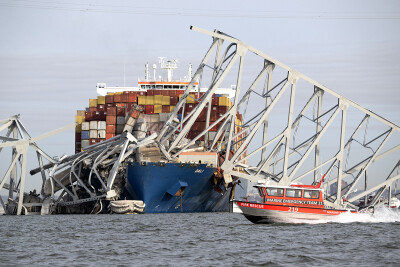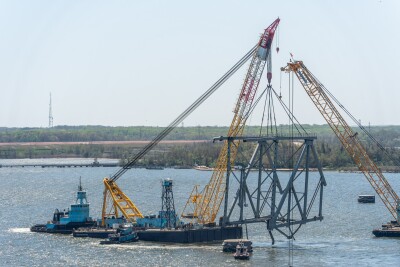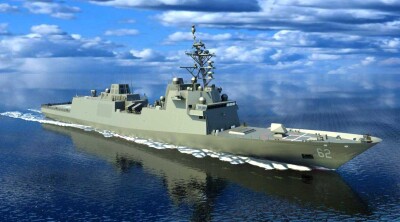Corps project to affect Mississippi barge traffic
Traffic flow will be disrupted over the next few months from mile 637 to mile 630 near Memphis, Tenn., as the Army Corps of Engineers widens a navigation channel at a narrow bend in the Mississippi River. The river will be closed daily from 6 a.m. until 6 p.m. Commercial barge tows will be allowed to pass each night and work will not start the next day until the queue is cleared, the Corps said. Officials expected to be able to pass some traffic during the day as the work progresses. The 90-day project began Jan. 5 and includes construction of six bendway weirs extending from the west bank out into the river. “The channel width depends entirely on the current river stage,” spokesman Jim Pogue said. “Weir projects like this in other locations have widened the channel as much as 200 feet. We are hoping for a similar result here.” The contractor’s contact pilot on the M/V Sheryl will be monitoring marine channels 13, 16, and 72 or can be reached at 573-803-7166. — D.K. DuPont
Edison Chouest acquires Bollinger Shipyards
Galliano, La.-based Edison Chouest Offshore has acquired Bollinger Shipyards. In a prepared statement, Bollinger said that Ben Bordelon, who is now chairman, president and chief executive officer of the company, and ECO acquired all assets and stock of Bollinger. It is unknown what the new ownership percentage breakdown is. Details of the purchase were not disclosed and Bollinger would not comment further. Calls to ECO were not returned. ECO, founded in 1960, operates a fleet of over 200 vessels, including PSVs, MPSVs, AHTSes, OSRVs, FSVs, and tractor tugs. It is the largest OSV operator in the U.S. Gulf, with approximately 36% of the market, according to IHS Petrodata. ECO also owns and operates four shipyards in the U.S. Gulf of Mexico, one in Brazil, and C-Port in Port Fourchon, La. C-Port is comprised of two terminals and 18 slips that are configured to transfer cargo and provide support services to OSVs. — David Krapf
Harsh winter cost $700 million in 2014, group says
The 2014 winter storms that brought shipping on the Great Lakes to a virtual standstill cost the economy more than $700 million and nearly 4,000 jobs, according to the Lake Carriers’ Association (LCA). The group has called for the construction of a second heavy icebreaker to partner with the Coast Guard’s Mackinaw to keep the shipping lanes open in the harshest of conditions. U.S.-flag cargo movement between Dec. 1, 2013, and May 30, 2014, fell nearly 7 million tons compared the same period in 2012/2013, LCA said. At least two steelmakers had to curtail production and some power plants were extremely low on coal. The limestone trade did not resume in earnest until well into April, and U.S.-flag lakers suffered nearly $6 million in damage trying to resupply customers.
DIESEL FUEL PRICES CONTINUE TO FALL
Diesel fuel prices fell 8 cents per gal. to $3.14 during the week ending Jan. 5 and fuel prices fell 47 cents per gal. over five weeks through Jan. 5, according to the USDA Grain Transportation Report. The Energy Information Administration reports that crude oil prices fell sharply in the fourth quarter of 2014 as robust global production exceeded demand. “After reaching monthly peaks of $112 per bbl. and $105 bbl. in June, crude oil benchmarks Brent and West Texas Intermediate (WTI) fell to $62 bbl. and $59 bbl. in December, respectively. Brent prices fell below the five-year average in early September and WTI prices have been below the five-year average since early October. Domestic crude oil production increased 1.2 million bpd in 2014, up 16% from 2013. At 8.6 million bpd, U.S. production is at the highest level in nearly 30 years,” the EIA said.




